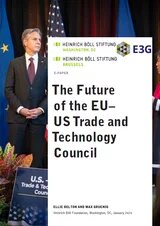The Future of the EU– US Trade and Technology Council
The US–EU Trade and Technology Council (TTC) was launched in 2021 as a forum to promote transatlantic cooperation and navigate trade tensions emerging from the use of new technologies. It was a signal of intent from the Biden administration to reaffirm the transatlantic relationship and rebuild relations on trade, following disputes over steel and aluminum tariffs under the first Trump administration. The TTC also functioned as a space to draw attention to the growing link between climate and trade agendas, as leaders on both sides pursued more ambitious climate agendas. However, after six ministerial-level meetings held over the course of four years, the forum is widely seen as having delivered only limited progress to date.
Following the re-election of Donald Trump to become the 47th US President from January 2025, it is unclear whether the TTC will continue to exist and, if so, in what form. The President-elect has stated that he will increase tariffs significantly if he is elected referencing tariff increases of 10–20% on all imports and 60% on imports from China. This would have significant consequences for the EU: the US is the EU’s largest export market. The European Commission has already publicly communicated that they are preparing retaliatory measures and have flagged possible concessions, suggesting that they hope to negotiate a deal to avoid the stated tariff increases.3 Trade Commissioner-designate Maroš Šefčovič has also signaled openness to continued cooperation with the US and an offer to “revamp” the TTC.
While there is considerable uncertainty over how this will play out, it is clear that the future of the TTC will hang on the outcome of any eventual negotiations. The challenges presented by renewed tensions over tariffs also suggest that maintaining a continued platform for regular EU–US dialogue over trade could be more important than ever, even if the space for cooperation is diminished. If the TTC can be restructured to suit a new phase of the EU–US relationship, it could emerge with a central role to address the challenges that the EU and US must meet together, including on the intersection of climate and trade.
Product details
Table of contents
Summary 3
Taking Stock of the TTC 6
Emerging trends in US and EU trade and climate policies 9
Scenarios for the TTC 13
Outlook and Recommendations 17
Authors and Imprint 20
